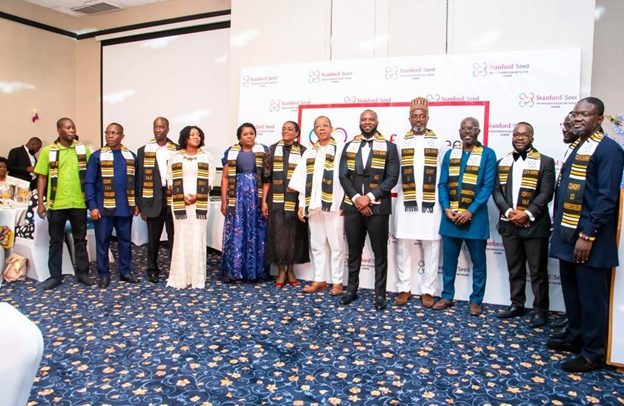The new executives of SSTN
The Stanford Seed Transformation Network (SSTN), Ghana Chapter has inducted 15 new members and executives to lead the Network in Accra.
The class of 2022, also known as cohort 12, is the most recent group of business leaders and CEOs to complete the Stanford University Graduate School of Business’ Seed Transformation programme.
They participated in intensive sessions led by Stanford Graduate School of Business faculty and industry experts, who were assisted by Stanford-trained advisors who used experiential approaches.
The mission of the Network made up of over 120 Ghanaian owned companies is to help local businesses to transition to international players by walking alongside member companies on their transformation journey and paving the way for others to follow through partnerships to grow.
Outgoing President, Linda Yaa Ampah, urged the new members to fully integrate into the network, contribute, and participate fully in its activities.
Dr Easton Reid who represented the US Ambassador to Ghana urged the members to address obstacles to business growth.
He was elated about the transformation agenda of the Stanford University which aims to position businesses in developing countries such as Ghana through the Stanford Seed programme to scale and make meaningful impact.
Prof Samuel Bonsu, Rector of GIMPA inducted the new executives to lead it for the next two years.
Mr. Carl Richards will lead the network as President, Prince Arkutu as Vice President, Godwin Doagbodzi as Treasurer, Elloeny Amande will oversee the Communications Secretariat, Efua Appenteng as Secretary and Lydia Fletcher will serve as Events & Learning Officer.
Mr. Richards, speaking on behalf of the newly elected executives, thanked the Ghana chapter for its confidence in them and welcomed the new members to the network.
“We are committed to our members’ growth and will assist them in meeting the new challenge that lies ahead by identifying opportunities for growth within the global economy to reduce poverty.” he added.
By Jamila Akweley Okertchiri

